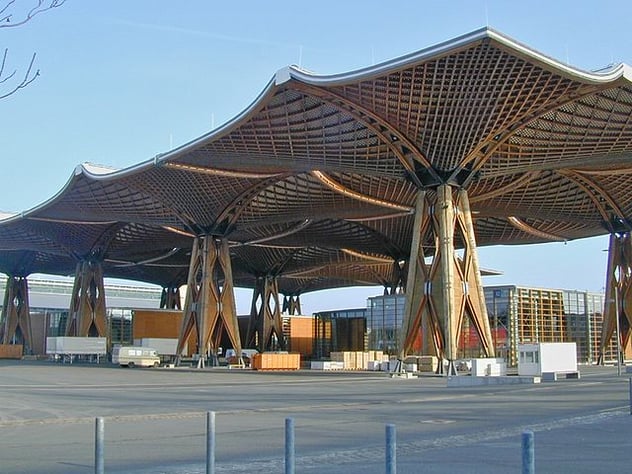- Home >
- Civil, Structural, Engineering Blog >
- Top 7 Construction Industry Trends Impacting the Field in 2022

2021 was a challenging year for engineering and the construction industry. Construction experts are forecasting demand for many types of construction to shrink in 2022, as the labor shortage is prompting many owners to delay or cancel already-planned projects.
Here's how to use the top construction technology trends to combat modern challenges and leverage ongoing opportunities for your company's growth.
1) Modular & Prefabricated Construction
Modular and prefabricated construction are structures built offsite and delivered to the intended site. It is seeing a tremendous increase in popularity, as conditions at the offsite space allow for better and more consistent quality. It also takes less time to build offsite, saving labor costs and decreasing construction time by 50%. This method also reduces waste by recycling leftover material, a significant problem for the field in 2021. By 2023, the modular construction market is projected to reach a whopping $157 billion.
2) Labor Shortage Woes
Construction and design firms are experiencing increased difficulty in filling hourly craft positions. Things like automation and lack of trade experience have amplified the industry's persistent labor shortage. The existing labor shortage in the construction field is expected to continue in 2022, so builders will need to invest in careful training and development to give workers the skills they need to succeed. Better tools, higher wages, and a more tech-savvy approach is key to attracting and retaining new employees.
3) Collaboration Technology
Collaboration is seeing a surge in popularity regarding coordination and communication between field teams and the office. Project collaboration platforms like Dropbox and Microsoft Teams are becoming standard practice in many businesses. Contractors and other groups collaborate even further by going paperless, adopting digital construction forms and automated workflows that manage field documents while eliminating inefficient processes.
4) Sustainability and Green Construction Technology
There is an increasing demand for sustainability to reduce the carbon footprint throughout the construction process. From 2006 to 2018, the number of LEED-certified projects in the United States increased from 296 to over 67,000. LEED (Leadership in Energy and Environmental Design) is the most widely used green building rating system globally, providing the framework for healthy, highly efficient, and cost-saving green buildings. Companies can measure the success of "going green" metrics such as lower operating costs, improved occupant health, and higher occupancy rates.
5) Increased Safety Measures
Safety is a primary concern in the construction industry, with 21% of workplace fatalities occurring in the construction field. Modernized construction safety equipment, such as wearables and IoT devices, help reduce onsite injuries by measuring the users' biometric conditions and surrounding environment. If someone falls, the devices can alert management to the user's location and respond accordingly.
6) Automation
Automation is another emerging engineering industry trend set to increase efficiency on construction job sites. Self-driving vehicles and drones performing repetitive tasks will help speed up the construction process, improving productivity and accuracy without displacing jobs. Automation leaves workers free to focus on specialized tasks while drones and robots take care of repetitive tasks, decreasing overhead and waste.
7) Design-Build
Design-build is seeing a dramatic increase in popularity and occurs when a single firm takes on the responsibilities of architects, contractors, and construction workers. The single point of responsibility allows for seamless communication, more organized feedback, more organic teamwork, and faster product delivery. Industry buy-in has been almost universal with 47 out of 50 states now using design-build for their public construction projects.
Shield Engineering is a leader in engineering innovation. Our team of experts offered integrated engineering and design services since long before it was “trendy.” We’ve always known it was the best way to do business.
Do you have questions about which opportunities the future of engineering holds for your project? We’re here to answer them. Contact us today to talk specifics and create a plan that works for you.


